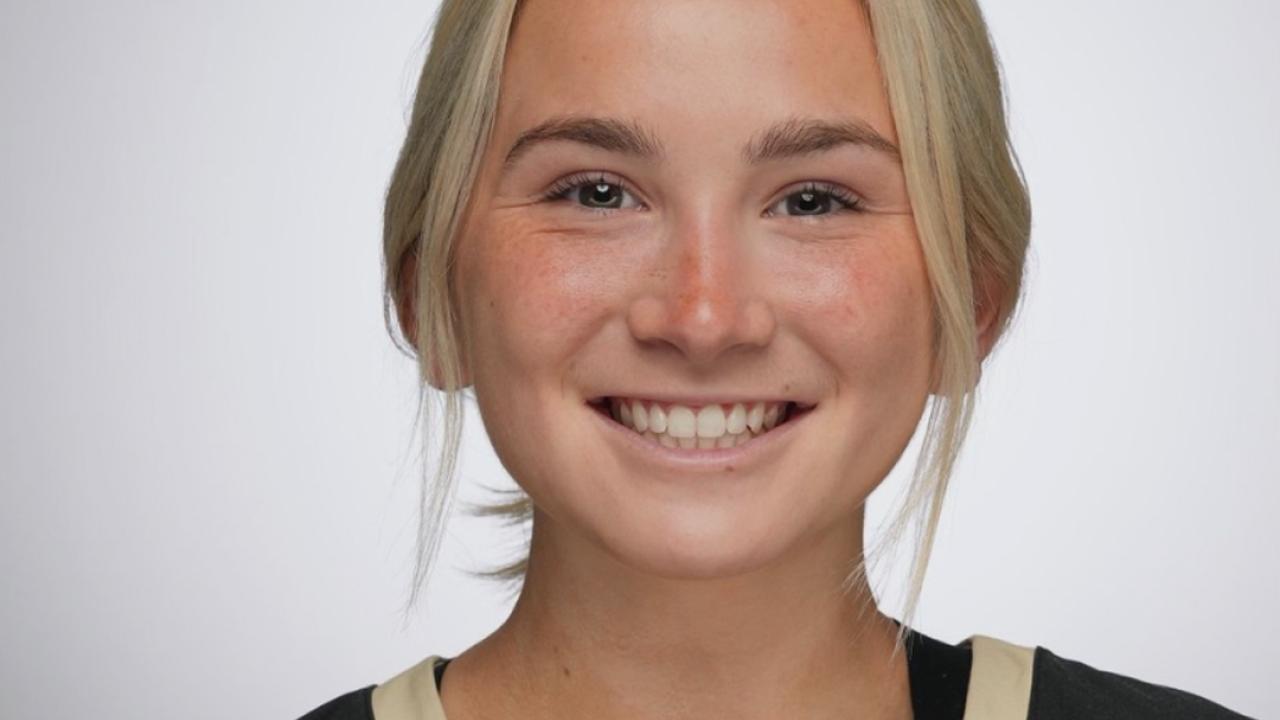The problem is that so many of us don’t feel like we have this landing pad. Instead, we feel like we’re a perfectly curated glass ball, and if we come near a hard surface at the wrong angle, we’ll shatter.
I don’t know how Katie Meyer, or Maddy Holleran, or Morgan Rodgers felt in the moments before they decided to take their own lives. I don’t seek to tell you how they felt, or to take away from their unique experiences. But I do wonder if I can imagine how they felt. And I think I can. I think that, if I had the chance to sit down with these young women during their lives, perhaps in the months leading up to their passing, we would’ve found resonance in our experiences as student athletes. We would’ve found common ground in conversations about pressure, expectations and worthiness. We would’ve found that we’d hiked similar, endlessly uphill mountains during our lives as athletes, and that the same darkness I once found my way out of wasn’t very different from the pain and loneliness that they too came to know. I’m confident, and disappointed, that most student athletes could engage and find resonance in this same conversation.
Student athletes, coaches, and every adult that comes near an impressionable, vulnerable collegiate athlete needs to be well informed on the practice of offering grace. When 35 percent of elite athletes suffer from disordered eating, burnout, depression and/or anxiety amidst limited privacy, inadequate recovery time and limited independence, there is no room for “mental toughness” or “discipline” when it comes to people’s livelihood. There is simply not. You — whoever you are, be it a coach, a player, a parent, a friend — you need to remember that athletes aren’t taught to hold space for the feeling of failure, or anything that resembles it. I don’t care if you were raised with “tough love” or you were having a bad day when you belittled the 20-year-old who stood in front of you, quietly yearning for your approval and feeling rejected when you didn’t offer it. Coaching or parenting or administrative philosophies aside, when you are an adult in this space, you have a massive responsibility to — above all else — make sure that the young adults with whom you work feel safe, loved, and valued.
When “mental toughness” is the answer to student athletes who are dreading waking up and going to practice the next day, I need it to be you — the adult — who says that it’s OK to take a step back. It is OK to reconsider the angle at which you’re coming at this from. It’s OK to take time away from the sport. Because it really is OK. And the more we resist the idea that we’re allowed to stop, or to walk away, or to take a day off, or admit to someone that we’re struggling, the more we begin to feel trapped. The more we feel backed up against a wall with no other options than to take the worst way out.
And as much as I’d like to tell athletes to make this decision themselves, and to trust themselves, I know how gutting and impossible it can seem to take even a day off. That is why we need the adults in our lives to make it known that we always have agency in those decisions, and that we won’t be punished for making a decision in the name of our own mental health.
I don’t spend time wondering about what might’ve happened had I not trusted myself enough to take time away from lacrosse during my collegiate career. Every bone in my body told me that I was doing what was best for me, while other people looked at me like I was giving up. It didn’t feel like giving up. If anything, staying in the dark place that I was in would’ve been giving up. Letting it consume me. That would’ve been what I’d done had I chosen to give up.
But instead I chose to continue. I chose to take the space I needed. I took the next steps forward in my life, a few steps away from lacrosse, a few steps away from my pride, from the athlete identity I’d held close for so many years. I needed to figure out who I was without lacrosse, and develop a sense of self — a sense of worth — outside of the sport, so that I was no longer depending on my coaches or my parents or the stat sheets to tell me I mattered. If I hadn’t taken this time and held this space for myself to fumble with young adulthood and with my identity, I would’ve resented lacrosse forever. I wouldn’t be where I am now, back on the field and playing Division I lacrosse alongside the women with whom I am writing this piece for. The women whose hearts and minds I will fight until my dying day to protect. It was my teammates, my coaches, my parents and myself who offered me the grace to take the time that I needed, to walk an unfamiliar path, and it is because of these people that I was able to find my way back. Because of their support, I was able to navigate my way out of the darkness instead of letting it consume me. Not everyone is so fortunate to tell the story that I do.
I say all of this because I want you to know that there is no shame in walking away. I say it because I want parents to let their children leave something that is no longer serving them, even if it breaks their hearts to see them part with their childhood sport. I say it because I want coaches to look at players like humans rather than commodities. I want athletic administrations to recognize that the pressure, the time and the energy that they impose on these young adults is intolerable. It is unsustainable to expect both perfection and consistency out of any human being, but it is especially egregious to make student athletes question their worth because they have not lived up to unrealistic standards.
If you are a student athlete, I know that you are doing your best. Whatever that looks like, I promise you that it is enough. There is choice in the dream. You get to decide what your life looks like, and when you feel backed into a corner, fruit flying at you from all angles, I need you to know that you can walk away. It is your decision, and it is a brave one. Because choosing yourself, and acknowledging that you are worthy simply because you are breathing — that is a brave thing. That is the most mentally tough thing you can do.
So it is on all of us — coaches, parents, teammates, administrators, professors — to hold one another accountable when we lose sight of what it means to be a teammate, a friend, a mentor, a leader. When we lose sight of the great responsibility that we have as influential figures in the lives of young adults, that is when we must reevaluate.
I would’ve loved for this piece to be a beautiful tribute to the lives lost, but because so many of these lives are lost because college communities have been remiss in their duty to confront the crisis that is the mental health of student athletes, I am issuing a demand to everyone involved in college sports. Players, coaches, parents, fans, professors, administrators, if you cannot do your job while simultaneously offering grace to the young adults with whom you work, you are unfit for your position.
It is of the utmost urgency that we have this conversation, albeit a difficult one, at every college institution in the country, so that I never have to write a piece like this one again.



























































